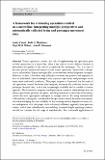A framework for evaluating operations control on a metro line: integrating multiple perspectives and automatically collected train and passenger movement data
Author(s)
Carrel, Andre; Mishalani, Rabi G.; Wilson, Nigel H. M.; Attanucci, John P
Download12469_2013_Article_65.pdf (858.8Kb)
OPEN_ACCESS_POLICY
Open Access Policy
Creative Commons Attribution-Noncommercial-Share Alike
Terms of use
Metadata
Show full item recordAbstract
Transit operations control, the task of implementing the operations plan in daily operations on a metro line, plays a key role in service delivery because it determines the quality of the service experienced by passengers. Yet, it is one of the most poorly understood aspects of rail transit operations. Faced with a disruption or infeasibility, dispatchers typically choose between several response strategies. However, to date, it has been very difficult to evaluate the positive and negative effects of individual control strategies with respect to operations and passenger travel times under real-world conditions. This paper proposes a framework for the study of rail operations control decisions that integrates automatically collected service and passenger demand data, which are increasingly available and accessible to transit agencies. The framework supports a multiperspective analysis methodology that can inform operational policies and plans, and help operations control decision-makers choose the most appropriate strategies to manage service. By using automatically collected data, taking into consideration the operations control decision environment, and acknowledging that the reliability of the resulting service depends on many factors endogenous to it, this paper takes a distinctly different approach from previous studies, which have relied heavily on modeling, assumed simple operating contexts, and did not consider the full range of available data. Two real-world applications of the framework, where control decisions are evaluated in terms of their operational and passenger impacts, are presented. The methodology is found to be versatile and valuable in providing insights that could not have been gained otherwise. Although the framework is applied to the London Underground, its logic, structure, and procedures are applicable and transferable to other metro systems recognizing that certain specifics would need to be tailored to the available data.
Date issued
2013-07Department
Massachusetts Institute of Technology. Department of Civil and Environmental EngineeringJournal
Public Transport
Publisher
Springer Berlin Heidelberg
Citation
Carrel, Andre et al. “A Framework for Evaluating Operations Control on a Metro Line: Integrating Multiple Perspectives and Automatically Collected Train and Passenger Movement Data.” Public Transport 5.3 (2013): 149–176.
Version: Author's final manuscript
ISSN
1866-749X
1613-7159